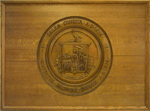Salem Witch Trials Memorial: Difference between revisions
From Salem Links and Lore
No edit summary |
No edit summary |
||
| Line 1: | Line 1: | ||
Salem Witch Trials Memorial | *The Salem Witch Trials Memorial was built adjacent the Charter Street Cemetery and timed to open the year of Salem's tercentenary (300th anniversary), on Aug. 5, 1992. | ||
Dedicated | *The design incorporates multiple elements of stone and plantings to symbolically represent the social indifference to the persecutions that were taking place in Salem in 1692. The memorial is surrounded on three sides by a hand-crafted granite dry wall. Inscribed in the stone threshold entering the memorial are the victims' protests of innocence. Six locust trees represent the stark injustice of the trials. | ||
Cantilevered stone benches bear the names and execution dates of each of the twenty victims. | |||
*The Salem Witch Trials Tercentenary Committee was awarded a grant from the National Endowment for the Arts for the memorial project. The design has received national critical acclaim. Dedicated on Aug. 5, 1992, with Nobel Laureate Elie Wiesel as keynote speaker. Salem Award winner Gregory Allen Williams, honored for his heroism in the Los Angeles riots was speaker as well. | |||
*The design, chosen from among 246 entries was the result of a collaboration between architect James Cutler and artist Maggie Smith, from Winslow, Washington. | |||
==See Also== | ==See Also== | ||
*[http://www.salemweb.com/memorial/ Salem Witch Trials Memorial] SalemWeb | *[http://www.salemweb.com/memorial/ Salem Witch Trials Memorial] SalemWeb | ||
*"Witch Trial memorial dedicated" ''Salem Evening News'', Aug. 6, 1992. p1 | |||
[[Category: Browse Index]] | [[Category: Browse Index]] | ||
[[Category: Statues and Monuments]] | [[Category: Statues and Monuments]] | ||
Revision as of 12:17, 29 October 2008
- The Salem Witch Trials Memorial was built adjacent the Charter Street Cemetery and timed to open the year of Salem's tercentenary (300th anniversary), on Aug. 5, 1992.
- The design incorporates multiple elements of stone and plantings to symbolically represent the social indifference to the persecutions that were taking place in Salem in 1692. The memorial is surrounded on three sides by a hand-crafted granite dry wall. Inscribed in the stone threshold entering the memorial are the victims' protests of innocence. Six locust trees represent the stark injustice of the trials.
Cantilevered stone benches bear the names and execution dates of each of the twenty victims.
- The Salem Witch Trials Tercentenary Committee was awarded a grant from the National Endowment for the Arts for the memorial project. The design has received national critical acclaim. Dedicated on Aug. 5, 1992, with Nobel Laureate Elie Wiesel as keynote speaker. Salem Award winner Gregory Allen Williams, honored for his heroism in the Los Angeles riots was speaker as well.
- The design, chosen from among 246 entries was the result of a collaboration between architect James Cutler and artist Maggie Smith, from Winslow, Washington.
See Also
- Salem Witch Trials Memorial SalemWeb
- "Witch Trial memorial dedicated" Salem Evening News, Aug. 6, 1992. p1
